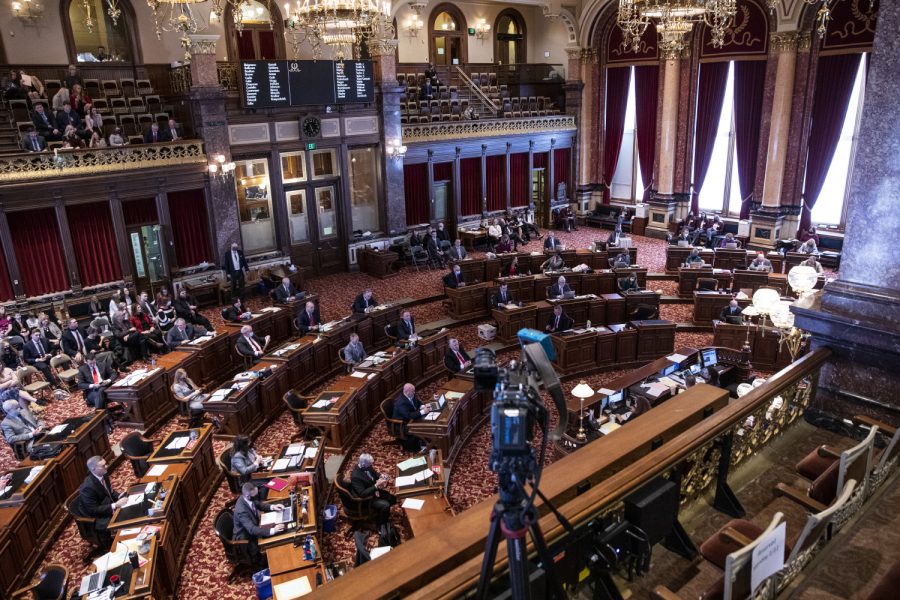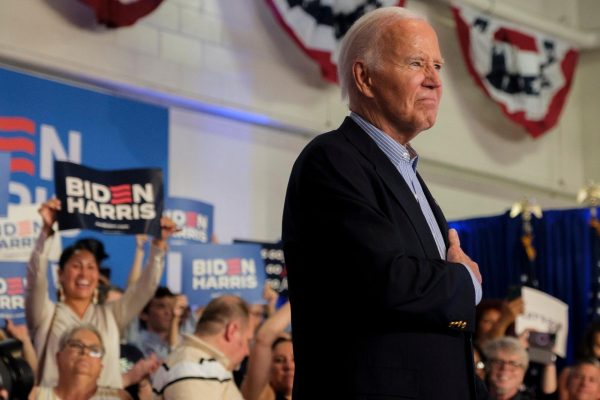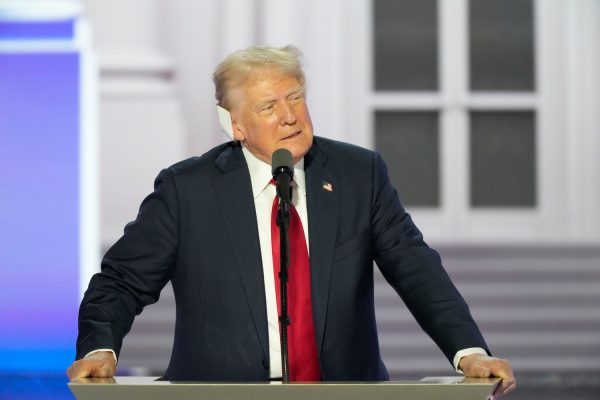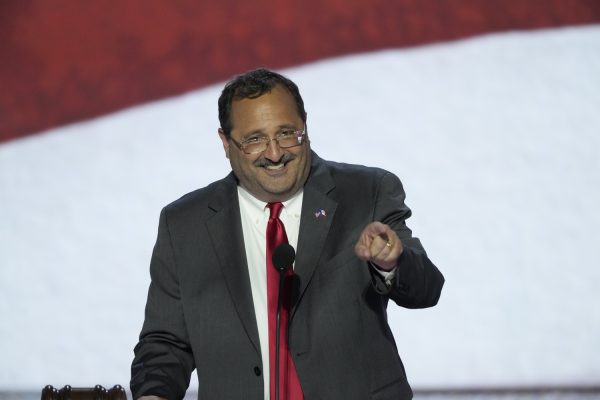Education bills flood state Legislature, only some survive legislative deadline
Republican members of both the House and Senate are pushing for more legislation targeting state universities while Democratic members see the legislation as a waste of time.
Members of the Iowa senate take part in the opening of the 2021 legislative session on Monday, Jan. 11, 2021 at the Iowa State Capitol in Des Moines. Legislative goals for the session include further tax cuts, expanding in-person learning, and moving towards economic recovery from the COVID-19 pandemic.
A flood of bills aimed to regulate how education institutions can operate were introduced in the Iowa Legislature this year, with some key bills surviving the March 5 legislative deadline, allowing the bills to move forward.
In order for a bill to advance through the session, it must be approved by at least one full committee in either the state House or Senate. The Republican majority can choose to call a vote at any time to resurrect a dead bill, however.
Republicans in both the House and Senate introduced a variety of measures specifically targeting public universities and K-12 schools and their intersection with the federal First Amendment, with the motivating factor being the protection of speech that Republican legislators have deemed is under attack.
House File 496, initially introduced in the Senate by Sen. Brad Zaun, R-Urbandale, is one such bill that passed the March 5 deadline. Opposed by the public university presidents and nearly 30 academic associations, the bill proposes ending faculty tenure at Iowa regent universities. Zaun did not respond to The Daily Iowan’s multiple requests for comment.
Rep. Mary Mascher, D-Iowa City, said Zaun’s bill to end tenure is perhaps the most concerning among recent legislation targeting higher education because it has received somewhat significant support from other Republican legislators, and it compromises the ability of state Board of Regents’ universities to attract faculty if tenure — created as a tenant of academic freedom — is no longer on the table for potential professors.
Mascher said Republicans mistakenly think professors are immune to disciplinary action, when in reality professors still undergo evaluations and can be fired. Tenured faculty members at the University of Iowa are reviewed every year and undergo a more extensive peer review every five years, according to the UI’s faculty-review procedures.
“One of the things that we’ve been trying to do is educate our colleagues in the House and the Senate about what tenure is and isn’t,” Mascher said. “But that’s an example of a bill I don’t believe is going to pass but still has an impact in terms of our faculty and staff recruitment.”
Rep. Steven Holt, R-Denison, said if Iowa were to end tenure at its regent universities, professors would be more conscious of the First Amendment and it would help put an end to assaults on free speech, regardless of what political ideology the speech stems from.
“The (House) Oversight Committee has had a number of students reach out to us and describe stories of what they’ve been through and how intimidated they feel,” Holt said. “Right now, it’s conservative speech that is discriminated against, but that pendulum could easily swing the other way, and so we don’t want that for anybody’s speech. I think that’s the reason that the possibility of ending tenure has gotten a lot of traction this year.”
Combatting misinformation about tenure — such as the misconception that faculty members aren’t reviewed — UI Provost Kevin Kregel said is a priority for the university.
“Higher education in general — and this is not just in Iowa, this is across the country — is getting pulled into the political specter,” Kregel said. “And so that raises the perspective of a public university that gets taxpayer funding. So, I think that’s being closely scrutinized.”
A March 2020 Pew Research Center study on the public opinion of American colleges and universities found that, from 2012 to 2019, citizens identifying as Republicans altered their perspective on higher education drastically around the time Trump was elected to the Oval Office.
The number of Republicans who believed college had a positive effect on the nation dropped from an already middling 54 percent in 2015 to 36 percent in 2017 — an 18 percent drop over the course of just one year. Democrats who participated in the survey remained relatively stable over the seven-year period, with 67 percent believing college was beneficial to the country in 2012 and 72 percent in 2017.
The same study also asked the question of whether the public thought higher education as a whole was moving in the right direction, to which 73 percent of Republicans responded that it wasn’t while 52 percent of Democrats agreed that it was.
RELATED: State Board of Regents recommend changes to syllabi, campus policies regarding free speech
Much of Trump’s rhetoric during his campaign and time in office was heavily rooted in populism and his effectiveness in appealing to voters who felt they were disenfranchised by career politicians in federal government, possibly explaining why there was such a sudden change among Republicans on the state of higher education.
Another bill to make it through the legislative funnel is Senate File 478, which would regulate diversity, equity, and inclusion training at public schools and universities, as well as impose penalties for teachers and professors who are found violating a student’s First Amendment right.
“At the college level, maybe a student is in the minority, as somebody who’s a conservative Republican, and the teacher in the classroom is coming from a more progressive point of view,” said Sen. Jeff Taylor, R-Sioux Center, during a February committee meeting. “There’s a very large power differential between teachers who have the power of assigning grades, and the students.”
This bill has similar language to an executive order from former President Donald Trump that aimed to make education more “patriotic” by prohibiting diversity, equity, and inclusion training that “scapegoats” a certain race or sex. SF478 was approved by the Senate Education Committee and is eligible for a floor vote.
Sen. Herman Quirmbach, D-Ames, said he’d be willing to support the bill on the condition that the Legislature makes some amendments to it, referring to a specific section discouraging diversity, equity, and inclusion training from discriminating against anyone based on characteristics like ethnicity and sex, where he’d like to see additional characteristics explicitly listed in the bill to prevent stereotyping.
“If you’re going to list any of these you should list them all,” Quirmbach said. “They’re all protected under Iowa law and if you’re serious about doing an even-handed job, you’ve got to include that. I would dearly like to vote for this bill, but we’ve got to fix a few things to make sure the bill is in fact as inclusive as it seems to want to portray itself as.”
Another bill to advance through the deadline is House File 415, which requires all Iowa school districts to conduct the pledge of allegiance every school day. This bill passed through the House in February, receiving opposition from only three Democrats.
Among the flurry of Republican-introduced bills that targeted education, many did not make it through the legislative deadline to be considered for further advancement.
These bills include House File 153, which calls for the appointment of a Public Policy Director at each institution to “organize group forums and individual lectures addressing prominent public policy issues from multiple, divergent perspectives,” as well as House File 222, which restricts public schools and universities from including rhetoric from The New York Times’ “1619 Project” in their history curriculum.
Other smaller, but similar bills that didn’t survive the March 5 deadline include House File 106, which states instruction of law students by a law school for up to two years does not constitute the practice of law, and House Study Bill 199, that states regent university course syllabi must be published on a university’s web page.
This came after an Iowa State University professor was accused of violating the federal First Amendment after telling her students that they weren’t allowed to write papers taking a stance against the Black Lives Matter movement or gay marriage.
Senate File 292, introduced by Sen. Jim Carlin, R-Sioux City, would’ve polled professors on political affiliation has been particularly contentious within the legislature, though it’s not advancing this year, according to Carlin.
Loren Glass, president of the Iowa American Association for University Professors (AAUP) and UI English professor, said he is under the impression from state legislators and the regents that most of these bills will not ultimately make the transition into law.
“I think a lot of these bills are shots across our bow to warn us how upset they are about the perceived violations of free speech,” Glass said. “It’s illegal by state law to judge any sort of hiring decisions based on political affiliation, so it’s unclear why they would want that information or what they would want it for. I think it’s really more a way of them telling us that they don’t like that they perceive us to be too liberal.”
Glass said the Iowa AAUP stands firmly for both free speech and academic freedom, and he believes that the UI supports free speech more firmly than many Republicans in the state Legislature.
“We’re happy to debate and deliberate all of these things on the basis of free speech,” Glass said. “That doesn’t mean that we want more legislation to suppress our speech or to make it harder for us to do our jobs, but we’re certainly open to debating and discussing the function of public higher education in terms of free speech and that’s a very important principle to the AAUP.”
These bills come after scrutiny directed at all three state universities for instances where lawmakers say the institutions mishandled student First Amendment cases.
Most recently was the UI College of Dentistry’s handling of a student who disagreed with rhetoric included in a mass email to students by the dean of the college condemning Trump’s executive order restricting diversity and equity training on public university campuses.
As previously reported by The Daily Iowan, the Legislature held a government oversight hearing earlier this year where the dean of the College of Dentistry, David Johnsen, said he would remove political rhetoric from future mass emails and review how the college handles disciplinary action for speech. Now, Johnsen will step down at the end of the semester, a year earlier than anticipated.
A UI presentation to the state Legislature in February said the university’s state appropriations have decreased by $8 million since fiscal 1998, and the state has consistently undercut funding requests by the regents, as previously reported by the DI.
Holt cited concerns with ineffective protection of free speech in general on college campuses as reasoning for recent legislation, referring to the Iowa State University professor who told her students not to write papers against BLM or gay marriage.
“That stuff is not what should be happening on university campuses, so my belief is that they feel like they’re Teflon coated because they have tenure, and that’s why I’ve asked them to have that discussion,” Holt said.
Carlin introduced a bill this session that would conduct a one-time, anonymous poll of staff political affiliation at regent universities and submit the results to the General Assembly. Though he told the DI he planned on putting the bill on hold until at least 2022, citing that he didn’t want to waste the time of his caucus by pushing for legislation that might not receive the support it needs to pass into law.
“I think having the balance of both perspectives kind of anchors each other,” Carlin said. “If you go too far to the right or too far to the left there’s going to be a counterargument — that was the intent. I want kids who attend our regent universities to be able to speak freely and be able to debate freely particularly in the political realm.”
Quirmbach said the bill was not only a thinly veiled attempt at intimidation targeted at public universities but also pointless because political affiliation is already public information via county auditor records.
Quirmbach said a similar piece of legislation was proposed in 2017 by former Sen. Mark Chelgren, R-Ottumwa, that not only advocated for polling professors on political affiliation but had an additional stipulation that would prevent regent universities from hiring professors in a manner that would result in a party affiliation imbalance of more than 10 percent.
He said it was important to realize that state research universities like ISU publish research in fields such as agriculture that significantly benefit many of the Republican Party’s biggest political supporters.
“A lot of the research we do up here at Iowa State is very relevant on a day-to-day basis to their industries,” Quirmbach said. “People who otherwise might not care about academic freedom understand that their industries are dependent on support from Iowa State.”

(he/him/his)
Email: [email protected]
Ryan Adams is the Films Assistant Visuals Editor at The Daily Iowan. He is a senior at the University of Iowa...























